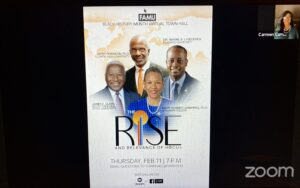
The HBCU community came together Thursday for a virtual town hall event titled “The Rise and Relevance of HBCUs.”
Held in honor of Black History Month, the event was spearheaded by Florida A&M University President Larry Robinson. He was joined on thepanelby prominent HBCU presidents Wayne A.I. Frederick of Howard, Mary Schmidt Campbellof Spelman and James E. Clark of South Carolina State University.
The panelists offered inspirational words about their universities and held conversations regarding social injustices, the effectiveness of HBCUs, and more.
The virtual forum gave recognition to HBCUs and alumni who have played a major role in their relevancy through their leadership in the community.
They included Howard alumna and U.S. Vice President Kamala Harris, FAMU alumna and Atlanta Mayor Keisha Lance Bottoms, and Spelman alumna Stacey Abrams, whose activism is credited for Georgia electing two Democratic senators last month.
“HBCUs are getting a lot of limelight now, SCSU along with all of the rest. We are not doing anything differently today that we were doing last week, last month, last year, 10 years ago, and some cases 100 years ago,” Clark said. “It is just that now people are starting to recognize and see it, something that we have known all along.”
HBCUs hold significance in the Black community by providing academic environments that give access to students with hopes of producing successful leaders. HBCUs provide education to all students, regardless of race, with an opportunity to craft and develop their skills.
FAMU’s Robinson said it is critical to cultivate successful students in the classroom and beyond at FAMU.
“FAMU is ranked the 20th in the country with regard to social mobility with an indicator of where students come in on the social-economic status, and how quickly we get them out and into the world. Ultimately, to gain full employment, but also meaningful roles in their community,” Robinson said. “We often say it is not just enough to come here and leave as a good scientist, educator, physician, or writer. We want our students to go back into the communities and be the Keisha Lance Bottoms of the future.”
The role and relevancy of HBCUs in national politics was clearly evident during the November election. Points were made during the forum about the election and the candidates’ plans concerning HBCUs. According to Spelman’s Schmidt Campbell, HBCUs have been relevant since the dawn of the Civil Rights Movement.
“Students from HBCUs have a long history of being deeply involved in the kind of activism that you saw at the election,” Campbellsaid. “In this era, it really was about organizing our communities in a way that they could come out and register, come out and vote, and understand how to avoid the hassle of getting trapped into the traps of voter suppression. It is not that we did something different — we just found a way of doing it that met the needs of today.”
HBCUs have pinned their place in social activism, as agents of change. They fought the issues of social injustice that are heightened in the present day by producing trailblazing alumni who have paved the way for students.
The panelists’ universal goal is for their students to continue to be agents forchange.